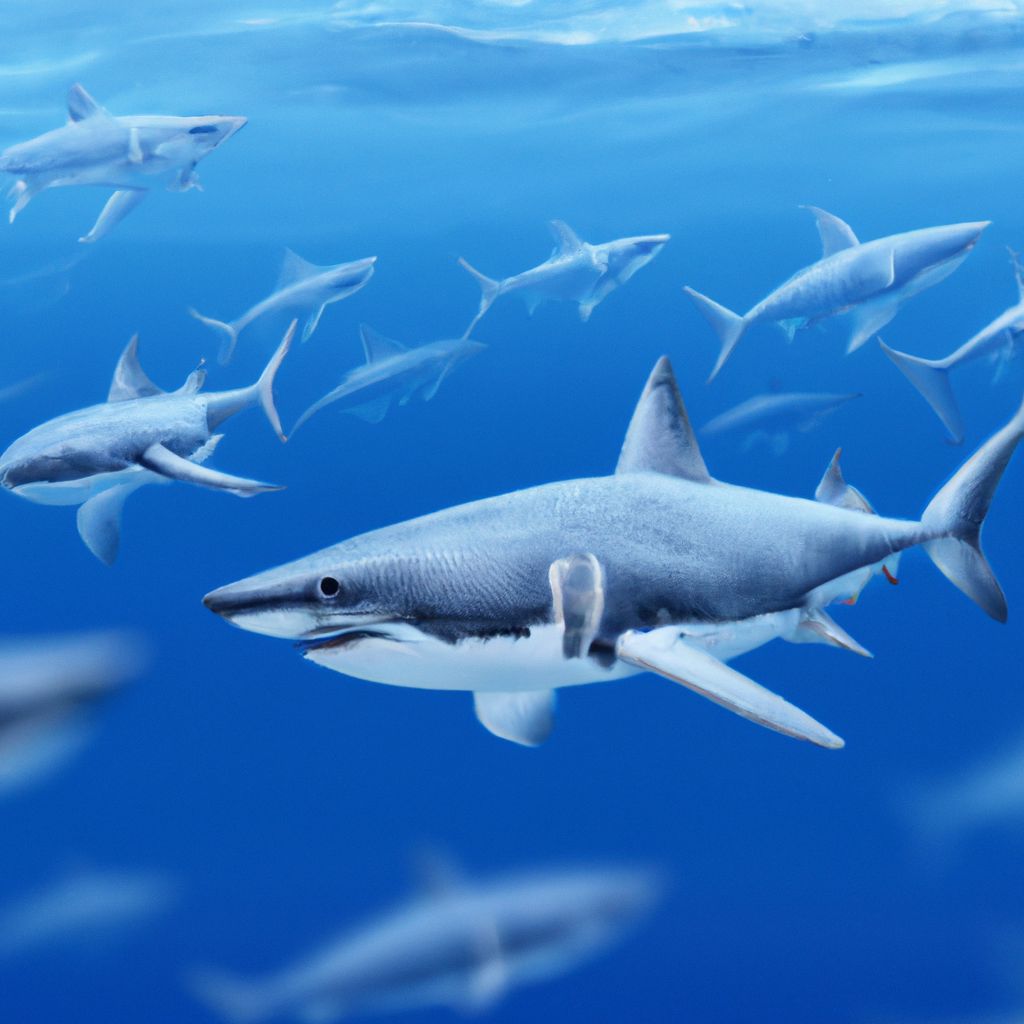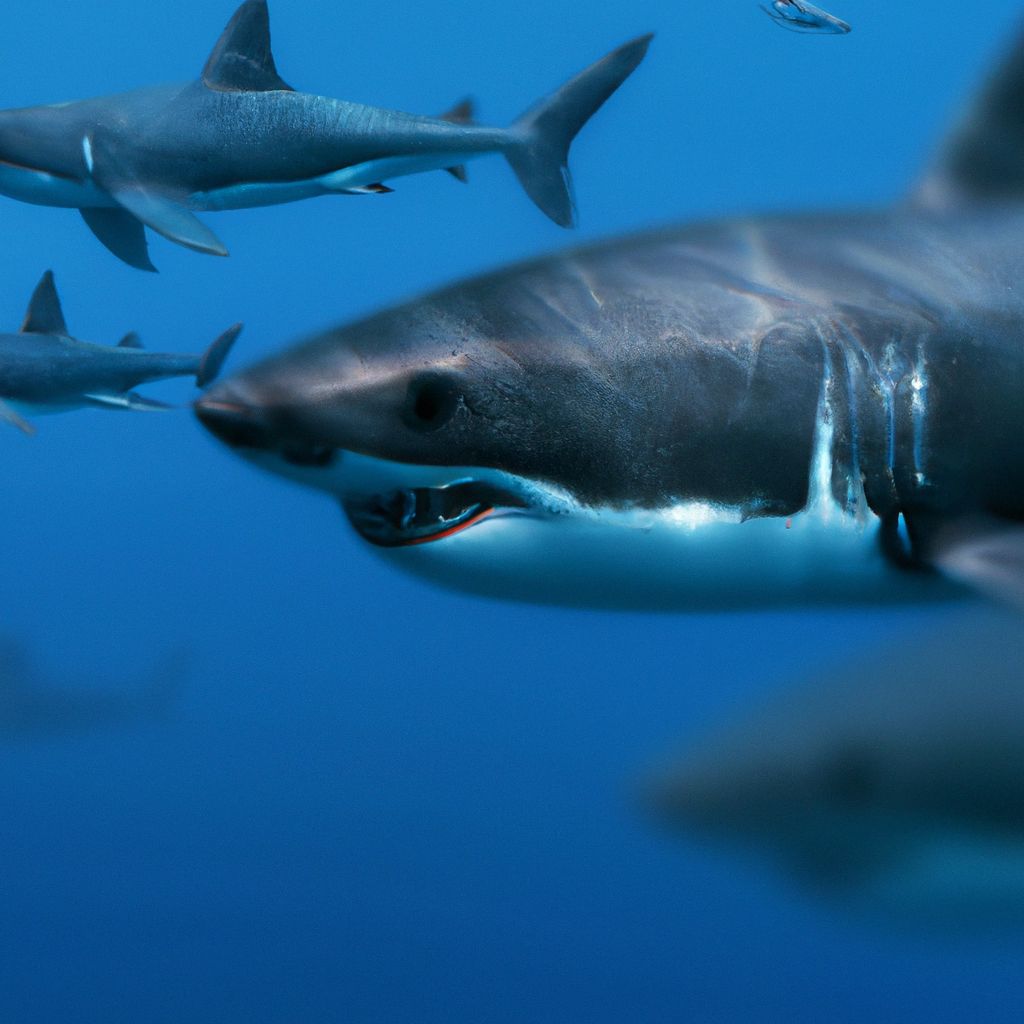
The mighty great white shark – apex predator of the ocean – has long captivated scientists and nature-lovers. Their impressive size and intimidating reputation has led to one big question: do these fierce hunters hunt in packs?
Diving deeper, we find that they’re mainly solitary. They cruise the depths, alone, on the hunt for their prey. But some recent studies show something else. Researchers have seen multiple great whites feeding on a single carcass! This hints at a cooperative behavior, like they form loose groups when scavenging for food. However, these meetings are temporary – they don’t have a permanent pack structure.
While it’s awesome to see social interactions among these sharks, it’s clear they prefer to go solo. Their instinct for independence overpowers any potential benefits of hunting in packs.
Key Takeaways
- Contrary to popular belief, great white sharks do not typically hunt in packs or groups.
- Great white sharks are solitary predators that prefer to hunt alone.
- While they may occasionally gather in groups, it is usually for mating or feeding purposes rather than hunting.
- The misconception of great white sharks hunting in packs may stem from their occasional association with other sharks during feeding frenzies.
- Great white sharks have highly developed senses and hunting strategies that allow them to efficiently hunt and capture prey on their own.
- Their solitary nature and hunting techniques make them highly effective apex predators in their marine ecosystems.
- Understanding the behavior and hunting patterns of great white sharks is crucial for their conservation and management in order to maintain the balance of marine ecosystems.
Background on Great White Sharks
Carcharodon carcharias, otherwise known as Great White Sharks, are one of the most impressive creatures in the ocean. They’re renowned for their size and strength. On average, they measure 15-20 ft and weigh around 5,000 pounds.
These sharks have an incredible sense of smell. They can detect the faintest scent of blood from miles away. They feed on seals, sea lions, fish, and other marine mammals.
Their hunting techniques vary, depending on location and prey availability. They spy-hop, raising their heads out of the water to survey the area. They also breach – leaping out of the water to grab unsuspecting prey.
In some places, they display cooperative hunting behavior. For example, in False Bay, South Africa, groups of sharks have been seen corralling fish into tighter schools.
One extraordinary event took place off the coast of California. A pod of killer whales targeted a young Great White Shark and kept it underwater for an extended period, shocking researchers.
It’s surprising to hear that these independent predators can hunt collaboratively. So if you’re feeling alone, just remember even Great White Sharks need their own space sometimes.
The Myth of Great White Sharks Hunting in Packs
Great white sharks don’t hunt in packs – they’re solo hunters, patient and stealthy. They rely on surprise attacks from below, and their senses are sharp. They can detect one drop of blood from miles away, and their eyes can spot prey near the surface. Plus, they can reach speeds up to 35 mph!
Many think great whites hunt in packs due to rare sightings of multiple sharks scavenging a carcass. It’s just a temporary congregating for an abundant food source.
The truth is these apex predators prefer hunting alone. Showing the ocean who’s boss with their solitary badassery!
Individual Hunting Behavior of Great White Sharks

The individual hunting behavior of Great White Sharks is precise and calculated. These powerful predators employ a variety of techniques, dependent on their prey and environment. Let’s explore!
- Hunting Techniques: Great Whites can ambush stealthily or chase down their prey at high speed.
- Prey Selection: Seals, sea lions, and smaller sharks are the primary victims. Great Whites use their senses to pinpoint targets.
- Solitary Hunters: Unlike some shark species, these predators hunt alone for increased success.
- Success Rate: Great Whites have the upper hand; they have an amazing nose, sharp teeth, and strong jaws.
To further highlight the prowess of these magnificent creatures, here’s a remarkable true story:
Off the coast of South Africa, a research team watched a single Great White Shark hunt a seal resting on a rock formation. In a flash, the shark flew out of the water, catching its prey mid-air before returning to the depths.
This incident demonstrates the immense power of Great Whites and their ability to strategize to get their next meal. Their individual hunting behavior continues to amaze and intrigue researchers.
Group Behavior and Social Interactions

The group behavior and social interactions of great white sharks have long captured the curiosity of scientists. Despite their reputation for solitary nature, recent research suggests they may engage in social activities. Let’s explore their fascinating world of group dynamics!
To better comprehend great white shark social interactions, take a look at the following table:
| Behavior | Description |
|---|---|
| Hunting in groups | Great whites usually hunt alone. But there have been occasions where they hunt in groups, challenging the idea of their independence. |
| Communication | They communicate with body language, posturing, and chemical signals. This helps form dominance hierarchies and keeps order within the group. |
| Feeding aggregations | When food is plentiful, they may form feeding aggregations. This includes individuals and groups, showing cooperation. |
These behaviors reveal interesting facts about their social interactions. But there’s more to it! Group hunting allows these predators to target bigger prey, with dominant individuals setting up a hierarchical structure.
Historical accounts of fishermen and divers provide invaluable knowledge, such as a 1998 observation of five great whites hunting seals off South Africa. This proves they can, in fact, have social tendencies.
So, who needs to worry about land predators when you can consider the possibility of great white sharks forming their own underwater neighborhood watch?
Possible Misinterpretations and Observations
Misunderstandings can arise from misinterpretations and observations of great white shark hunting behavior. Let’s break this down in a table to give the facts.
| Misinterpretation/Observation | Explanation |
|---|---|
| Great white sharks hunt in packs | Great white sharks are solitary hunters. They don’t engage in pack hunting. They usually hunt alone or in small groups for specific reasons, such as breeding or feeding. |
It’s important to note that great white sharks lack the social structures and communication systems needed for pack hunting. They rely on their own individual hunting abilities.
Frequently Asked Questions
Q: Do great white sharks hunt in packs?
A: No, great white sharks are solitary hunters and typically hunt alone.
Q: Are there any instances of great white sharks hunting in groups?
A: While great white sharks primarily hunt alone, there have been rare instances of multiple sharks gathering to feed on large carcasses.
Q: Do great white sharks cooperate or communicate while hunting?
A: There is no evidence to suggest that great white sharks cooperate or communicate with each other while hunting. They rely on their individual hunting skills and instincts.
Q: Can a group of great white sharks be considered a pack?
A: No, the term “pack” is usually associated with social animals that work together in a coordinated manner. Great white sharks do not exhibit this behavior.
Q: Do great white sharks pose a greater threat when hunting in groups?
A: While multiple sharks feeding on a large carcass may create a more intense feeding frenzy, great white sharks do not specifically target humans as prey. The chances of encountering a group of hunting great white sharks are extremely rare.
Q: Are great white sharks more successful hunters when solitary or in groups?
A: Studies show that great white sharks are highly efficient hunters when solitary. They have developed exceptional hunting strategies and rely on their individual skills to catch prey.
Conclusion
Great white sharks are amazing hunters. They hunt alone, not like other predators in packs. Ambush is their skill. With their huge size and speed, they can strike quickly and powerfully with their jaws.
But, in 2009, something unusual happened. Off South Africa’s coast, five great whites worked together, like a team. This was unique! Seals were herded into a corner, cutting off their escape. It showed the intelligence and social skills of the species.
This event does not contradict the fact that great whites hunt alone. More research is needed to know if this kind of behavior is common or just a one-time thing.



